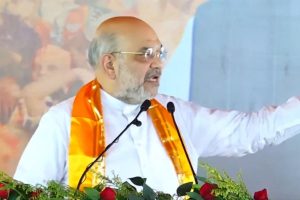What is the meaning of life? What purpose, if any, do we serve here on Earth? Why are we here? These are some of the oldest questions of humanity. While science explains the ‘how-s’ of life, it is happy to leave its ‘why-s’ to other disciplines to address. The other branches of human knowledge ~ metaphysics, theology, psychology, history, sociology, etc. ~ do attempt to answer these questions from their own perspectives, answers which are remarkable not only for their divergence and also for the infinity of paradoxes and contradictions that they create.
For some people, life may be all about having a family and to go on living till death, while for some others, it is all about accumulating wealth. Some live this life for an eternal afterlife without having any idea about the purpose of such an afterlife. The meaning of life may be diverse for different people; it could be the pursuit of either knowledge or religion, or art or love. To Aristotle, “Happiness is the meaning and the purpose of life, the whole aim and end of human existence”; to Camus, it is the absurdity of the human condition that we search for meaning in a world which has none. Nietzsche believed that the question itself was meaningless, while Plato defined man as ‘A being in search of meaning.’
The sixth-century Chinese sage Lao Tzu ~ author of Tao te Ching or the Book of Change ~ believed that neither goals nor accomplishments impart any meaning unto our lives ~ that the value and meaning of our existence come from the universe itself of which we are a part, and it requires no effort on our part to derive a meaning for life. Mystery is the essence of our existence, and we, the wayfarers, are also part of Tao ~ the way, which is unknowable. Even though life may not be comprehensible, it is certainly not meaningless. Many people believe that even though life may be devoid of meaning, it is nevertheless valuable because it makes us happy and brings moral good, while others feel that we only impart meaning unto our own lives by choosing how to live.
“The day was sufficient to itself, and so was the life”, as the philosopher Richard Taylor said in his 1970 book, Good and Evil. The question of the meaning of our life is also closely associated with the existence of life elsewhere in the Universe. Indeed, if life exists elsewhere, then our life may not just be happenstance as it is believed; we then become part of a larger whole. It is very much likely that life exists in the millions of planets in the goldilocks zones within galaxies scattered across the Universe where water can remain in the liquid form, a condition believed to be essential for the existence of life as we know it. However, so far the Earth has been home to the only life known to us.
Countless species on earth had found their way into extinction through geological times, and no star is going to blink in sorrow if humanity also meets the same fate. There is no deeper meaning encoded in our DNA. Whether life has meaning or not, one thing is certain, life is full of pain and suffering, and those who have passed through a great deal of suffering may have a different, and perhaps more realistic, perspective on life. In that context, the 1946 book Mans Search for Meaning by the Nazi concentration camp survivor Viktor Frankl is interesting.
Talking about his experiences in Auschwitz, Frankl observed that a prisoner passed through three stages ~ shock after arrival, followed by apathy and emotional death, and then disillusionment with life, even if he manages to survive and see freedom. Frankl says that a man can survive anything only if he has found a meaning for living, which is his deepest desire. Apathy towards life arises from the feeling of being doomed, from being unable to control the circumstances in any way.
Frankl says that a man can still choose his attitude even in the worst of suffering, and thereby derive a meaning for his life. He survived three years at Auschwitz by thinking about what he would do after the camp ~ to inform the world about the survival strategies and help others to live in the face of crises. He says a man can find meaning either through work, love or suffering; the image of his wife indeed helped him in his most difficult times. The question about the meaning of life is something that had bothered each one of us at some point in time.
I had my doubts during my college days while studying physics. I surmised that since physics played a larger role in the Universe than biology ~ gravity and electromagnetic forces and all that stuff without which the Universe would not have existed or created the conditions for life to evolve ~ and because the Universe was also created ex nihilo ~ out of nothing, through an incomprehensible quantum fluctuation, life has intrinsically no meaning. It turned me towards atheism which allowed me to evade the question, at least till the time I got so preoccupied with the more pressing businesses of an otherwise meaningless life that the question of meaning rarely occurred in my mind.
I had the opportunity of re-examining the question while reading Yuval Noah Harari’s 21 Lessons for the 21st Century, a collection of 21 themed essays, one of which discussed the meaning of life. Harari says that man, being a storytelling animal, weaves the meaning of life around several stories that ultimately carry no meaning. One such story, propagated by religion, is that we are all parts of an “eternal cycle that encompasses and connects all beings” where each has a distinct function to fulfil, to understand which imparts the meaning unto our life.
Citing the Mahabharata and the Bhagavadgita, he says that each has a unique Dharma, following which each fulfils his role in the Cosmic drama, which is eternal and inescapable. One must fulfil one’s predestined role in this drama, so as to uphold the laws of Nature. This is a circular story which gives a fixed identity to each individual. In contrast, there is a linear story followed in Islam or Christianity which says that God created the universe and expects all humans to conduct themselves in a certain manner, as decreed by religion.
Following God’s commands is the only meaning of an individual’s life so that on the great Judgment Day, each is punished or rewarded according to their deeds on earth. A similar story is also provided by Nationalism which commands that one’s life gets meaning by contributing to fulfilling the destiny of one’s nation and by advancing its interests in all situations, even when it harms the people of other nations. Communism ordains that the mission of one’s life is to advance the cause of revolution and establish the dictatorship of the proletariat, while Fascism directs every citizen to believe that his nation is superior to every other nation and its interests are supreme to every other consideration including the wellbeing of the individual himself.
These are all stories and they derive their power by giving the individual a role to play and hence imparts an identity; and also by embedding the individual into a timeless cosmic eternity, something bigger than himself which he cannot fathom. All these stories have serious shortcomings. Nation, God or religion are all artificial constructs invented by humans; the world was not created with any of these entities. The circular theory does not convincingly explain why one has to be reborn endlessly and pass through the same lifecycles in order to fulfil an amorphous cosmic drama whose features remain unknown.
Eternity also is a vague concept, since we are discussing the meaning of life, eternity cannot logically extend beyond the life of humans on earth which is only 250000 years (leaving aside the animals who had evolved earlier than humans and the question of meaning of their lives). Humans are not destined to live for eternity either, we do not even know if humanity will survive another 50,000 years. Linear theory does not explain either why people have to strive in life for some reward in afterlife whose features are equally unknown.
(To be concluded)
(The writer is a commentator. Opinions are personal)











